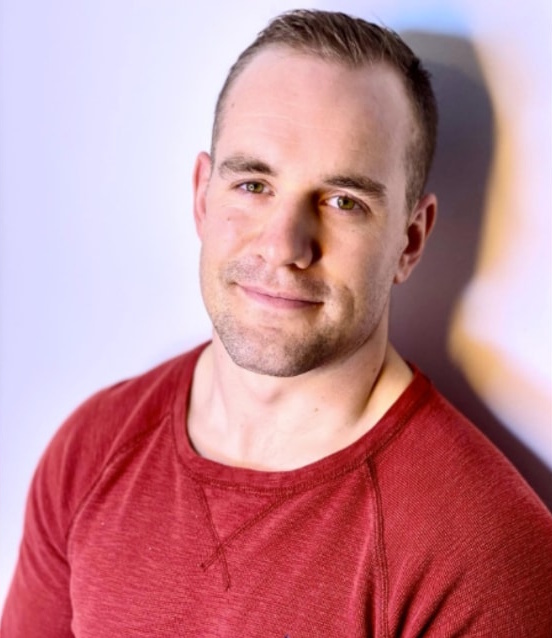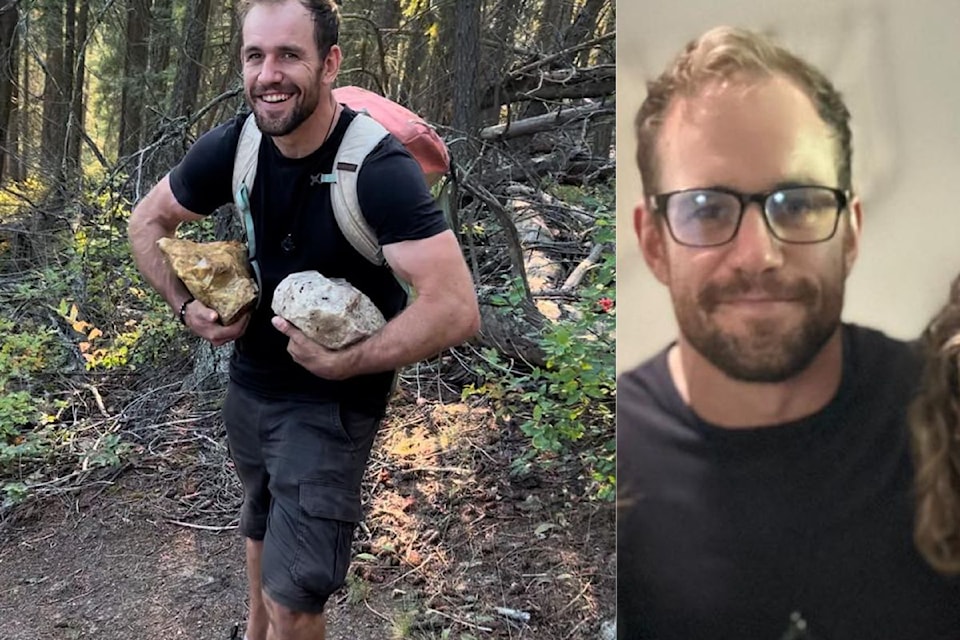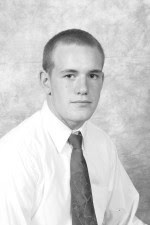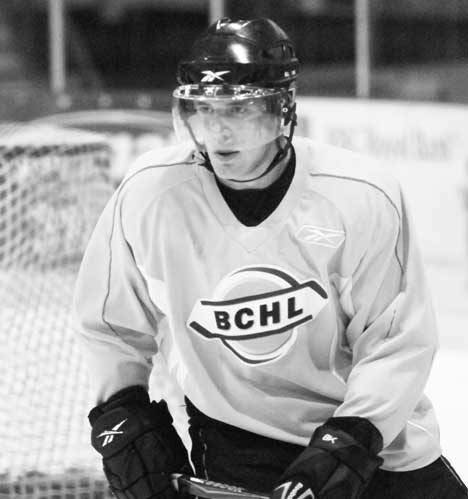TRENT DORAIS MEMORIAL
Lumby hockey enforcer remembered Saturday
Trent Dorais lost his battle with CTE in March. All are welcome to attend his celebration of life at Camo Country Weddings and Events May 24
Warning: This article discusses suicide, which may be triggering to some readers. If you're in a crisis, call the Suicide Crisis Hotline at 9-8-8.
Brendan Shykora - The Morning Star-April 22,2025

A celebration of life is being held this weekend for Trent Dorais, a Lumby man whose big personality and leadership qualities endeared him to his hockey teammates, and whose role as an enforcer left him with brain injuries he would later succumb to - injuries he was working towards bringing to light.
Dorais, 33, was declared missing from the Lumby area in March. He was found deceased more than a week later, on March 28.
He is survived by four children, parents, siblings, grandparents, cousins, aunts and uncles, nieces, a nephew, a girlfriend and a wide circle of friends.
The celebration of life will be held at Lumby's Camo Country Weddings and Events (45 Trinity Valley Rd.) at 2 p.m. Saturday, May 24.
"Trent possessed the kind of energy that put smiles on our faces, made us laugh and could lift our spirits with his infectious smile just by walking into a room," a family member said on social media.
"This gathering is a chance for all who knew him to come together, share stories, and celebrate the joy he brought into our lives."
Dorais was a hockey player who played five seasons in the BC Hockey League, from 2007 to 2012, with the Vernon Vipers and the Alberni Valley Bulldogs.
Dorais's mother, Charlie Fedora, told The Morning Star her son was an enforcer who never hesitated to drop the gloves and fight. That led to him suffering from chronic traumatic encephalopathy (CTE), a disease that stems from repeated head trauma.
"He was a grinder," Fedora said, adding she thinks Dorais made the Vipers' roster at the age of 16 because of his physical play. She remembers standing beside the owner of the Vipers in 2007, when Dorais was a walk-on at the Vipers' camp. She watched as he knocked down Robbie Short, a Vipers player who was a couple years older than Dorais and tough as nails.
"I'm pretty sure that's the moment Trent made the team," Fedora said.
A video from 14 years ago highlights team captain Dorais as Port Alberni's player of the week. It shows a glimpse of his personality, his ethos of hard work, his love of fishing when outside the rink. It also shows that fighting was ingrained in his role on the team.
"He's an emotional kind of leader where he'll go out and make a big hit, or if he has to drop the gloves, he will," says head coach Paul Esdale in the video.
Fedora isn't angry with anyone who may have led Dorais towards an enforcer role; that was how the game was played back then, and still is to a lesser degree.
Fedora said Dorais was aware of the fact that CTE was significantly affecting his life, and he was working with some other hockey players - among them former NHL players - to raise awareness about CTE and brain health.
Tragically, Dorais's brain injuries were too much to bear. He'd been battling for years. The CTE had led to depression and addiction issues, as it often does, but Dorais was eight years sober at the time of his passing.
"He won most of his battles with it all, but he just couldn't overcome the brain health," Fedora said. "He made the choice to not live with that anymore."
Nolan Graham will be speaking at Dorais's celebration of life. Fedora said Graham was also a hockey player and "lives every day with exactly what Trent was dealing with."
People can RSVP for the celebration of life here. Anyone who has a photo or a written memory of Dorais can include it in their RSVP or bring it to the event.
"His story lives on in all who knew him and we want to compile the stories and memories of his life for his children as something they can keep with them in the years to come," his family said.
Trent Dorais
Trent Dorais, 33, was last seen in Lumby on March 20
Missing Lumby man found deceased
Roger Knox - The Morning Star-


Update: 12:25 p.m. Saturday, March 29
Lumby man Trent Dorais, who was missing for over a week, has been found deceased according to a member of his family.
"Trent was located today and we now have closure; unfortunately, this was not the outcome we all wanted but feel comfort that Trent is now at peace," Dorais' step-father, Lumby resident Corey Dunn, wrote on Facebook Saturday morning.
Dorais' sister shared on Facebook that Dorais had been located. She did not say whether he had been found alive.
"Thank you to everyone that has helped," the sister wrote.
Dunn's post elicited an outpouring of condolences for the family. Close to 600 people reacted to the post Saturday morning.
The Morning Star reached out to the Vernon North Okanagan RCMP Saturday morning but did not get a response by publication.
and brother.


Police have confirmed that a body was found Friday, but the death was not initially considered suspicious.
Vernon North Okanagan RCMP said the body of a 33 year old man was located on a forest service road near Lumby.
Mounties said criminality was not suspected, and that police and the B.C. Coroner Service were investigating the circumstances of the death.
Dorais played parts of two seasons in Vernon with the Vipers from 2007-2009. In 39 games with the Vipers, Dorais collected (3-goals-7-assists-10-points).
Dorais signed with the Alberni Valley Bulldogs May 28th 2009 played three seasons in Alberni Valley from 2009-2012 was captain of the Bulldogs.
Late Lumby hockey enforcer wanted to start mental health charity game
Knowing he'd suffered from serious head injuries, Trent Dorais wanted to raise funds and awareness about mental health through hockey. His friend Colton Sparrow is determined to make that happen following his death
At a celebration of life for Trent Dorais last weekend, it was patently clear how much the late Lumby father continues to live in the hearts of friends, family and former teammates.
The love he inspires was evident in the words of his mother, Charlie Fedora, who in front of a crowd of hundreds told the story of Dorais' life, not leaving out the details that led to his death.
"He had a heart that loved deeply and loyally, especially when it came to his family," Fedora said, adding her son was "fiercely protective" of his sisters, brothers and step-siblings.
He was also fiercely protective of his teammates.
Dorais had been an enforcer in his hockey-playing days. He played for the Vernon Vipers and the Alberni Valley Bulldogs in the BC Hockey League, and earned the kind of respect on the ice that is reserved for tough customers.
Head injuries sustained in fights and physical play left Dorais with symptoms akin to chronic traumatic encephalopathy (CTE), a disease that stems from repeated head trauma. Fedora said her son suffered from severe depression as a result.
Following a missing person report, Dorais' body was found on Saturday, March 29. He left behind four children, parents, siblings, grandparents, cousins, aunts and uncles, nieces, a nephew, a girlfriend and a wide circle of friends.
One of those friends is Colton Sparrow, who like Dorais played for the Vipers and went on to join the team's staff for four and a half years, serving some of those years as assistant coach.
"He was a special guy for sure, and he certainly fought his demons, but he was one of the most selfless guys I ever met," Sparrow said of Dorais.
Sparrow knew the Dorais family well. As a teenager he was always at their home, expelling rampant energy as teenage boys do. He and Dorais would put on boxing gloves and exchange blows for the fun of it.
Dorais was a role model for a young Sparrow who had big ambitions in the world of hockey.
"He was a few years older and a tough kid, strong, a really good hockey player, and for me that was my whole life at that time, trying to make the NHL and striving for that," Sparrow said. "I definitely looked up to Trent and I felt safe around him...he treated me almost as his little brother."
In many ways, Sparrow and Dorais' lives were in lock-step as they matured. Both played for the Vipers having made the team at a young age. Sparrow was barely 17 when he got his shot with the Vipers. Dorais was a 16-year-old walk-on who impressed enough at Vipers camp to earn a spot on the roster.
Dorais signed with the Alberni Valley Bulldogs in 2009 and became the team's captain. Sparrow, then playing for the Vipers, ended up playing against Dorais for a couple seasons.
"He wasn't a lot of fun to play against," Sparrow said of his friend with a chuckle. "He was about as tough as they come...I remember knowing when he was on the ice because of the way he played."
Dorais eventually moved back to Vernon, and that's when he and Sparrow began to talk to one another about head injuries.
Having left for college earlier, Sparrow himself had returned to Vernon to join the Vipers' staff. Around 2021, Dorais reached out to Sparrow with an invitation to grab coffee and catch up.
"We got together at the rink just outside of my office and we sat and we had a coffee, and that was when we kind of first discussed (head injuries)," Sparrow said.
Head trauma was essentially what ended Sparrow's playing career. He said he had a "really bad" head injury while playing professional hockey in Sweden. He was blindsided by a late hit coming across the blueline at a moment when he'd let his guard down after an offside whistle.
"I ended up on the ice, and the mistake I made is, me being the way I was, I was pretty fiery and right away I got up," Sparrow recounted. "I knew I was hurt but I got up and I was looking for the guy who hit me."
Sparrow dropped the gloves with the defenceman who hit him and wound up taking a heavy punch in the fight. It was that second blow to the head that Sparrow thinks did the most damage. He spent almost two full days in hospital as CT scans were done, with doctors worried about potential brain bleeding. It was deemed he'd suffered a "pretty aggressive" concussion.
"It took quite a bit of time for me to recover from that one, and I think that was a big part of me deciding not to go back the following season and play," he said. "I was able to listen to my body and understand that probably if I got another one of those (concussions) it would only get worse."
In their first conversation, Sparrow and Dorais talked about their respective head injuries, and the lingering effects.
"I'll never forget that first conversation because I feel like it was such a weight lifted off both of our shoulders," Sparrow recalled. The two kept talking. They'd grab coffees and offer each other words of support. Though Dorais wasn't on the Vipers' staff, he'd come to the rink, put on a helmet and skates and run battle drills with the players in the corners.
Eventually, Dorais told Sparrow he wanted to spread the conversation of head injuries beyond the confines of Sparrow's office.
Trent's legacy
"I don't know if we ever used the term CTE," Sparrow said of his conversations with Dorais.
Indeed, as Fedora said at the celebration of life, while Dorais "truly believed" he had CTE, the doctors couldn't definitively diagnose it because such a diagnosis can only come after an autopsy.
High-level hockey players are to some extent hooked on adrenaline, and Sparrow says both he and Dorais had to work to find an outlet for that energy after leaving the sport.
"It's the thrill of competing, and when it's hard to find that in everyday life, I think that's where you really need to learn to slow down and find other ways to relax and calm yourself," he said.
The two would do deep breathing exercises in Sparrow's office. Sparrow noticed some progress in his friend in those days.
"What really hurt when he passed was that I felt in the last couple of years he'd really made some gains, I had really thought he'd made some strides. And sometimes maybe you make strides but then you go backwards. It's an everyday battle."
Starting a couple years before his death, Dorais repeatedly mentioned to Sparrow an idea he seemingly couldn't get out of his head.
"He would always talk about wanting to do a charity game, like putting together a game towards mental health," Sparrow said.
Life got in the way of bringing that idea to fruition. But in memory of his friend, Sparrow is determined to make a mental health charity game happen.
Sparrow is currently living in Fort St. John but is moving back to Vernon in August, having been hired by the Greater Vernon Minor Hockey Association to do player development. Once he returns, he plans to use his new connections with the association and his old ones with the Vipers to set up an annual charity game in Dorais' honour.
Funds raised would go towards mental heath support organizations, and Sparrow said some of the funds could be used to set up a foundation for Dorais' children.
Sparrow said he's already gotten enthusiastic support from high places in local hockey about the idea.
Should fighting be a part of hockey?
Dorais suffered the long-term effects of being a hockey enforcer, and growing awareness of CTE and other forms of head trauma in recent years has sparked debates on the degree to which fighting should be a part of the game. Sparrow sees both sides of the debate.
On the one hand, being an enforcer and regularly dropping the gloves exposes players to repeated blows to the head that can have long-lasting health implications. On the other hand, some say removing fighting from hockey altogether would remove the way hockey players police themselves on the ice, leading to players being able to target the head on hits with impunity.
Sparrow played a couple seasons in the NCAA. In the college league, players wear full-face cages which effectively removes fighting from the game. Sparrow said while fighting wasn't part of the game, hits to the head were more common in that league than in others he's played in. "Some of the hardest hits I ever took that resulted in some pretty bad headaches and head injuries were in college hockey," he said, adding he believes players were able to "take a pretty good liberty at a guy while knowing nobody's going to come beat you up afterwards."
He described a play in which a college player "was able to knock my head off without any sort of repercussions."
While Sparrow doesn't thinks fighting can be removed from the game completely, he agrees there should be limits on fighting, especially at the younger levels. And he's seen some progress on that front first-hand.
He said in his second year in the BCHL in 2011-12, the league introduced a rule that players could only engage in six fights in a season without getting fined or suspended. That limit has been lowered over the years.
"That just kind of took away the guys that were just trying to fight every night," Sparrow said.
He says he got through his first fight unscathed at the age of 16, and adds younger players still need the odd experience like that before they turn pro and are thrown into a league where fighting is commonplace.
Positive strides have been made, said Sparrow, and young players are more aware of the potential cost of fisticuffs on skates.
"Kids nowadays understand the risks of head injuries," Sparrow said. "I didn't play that long ago but I remember, even in 2010 or 2009, there were guys fighting all the time, and it was ugly. And so I think we've made progress in that for sure."